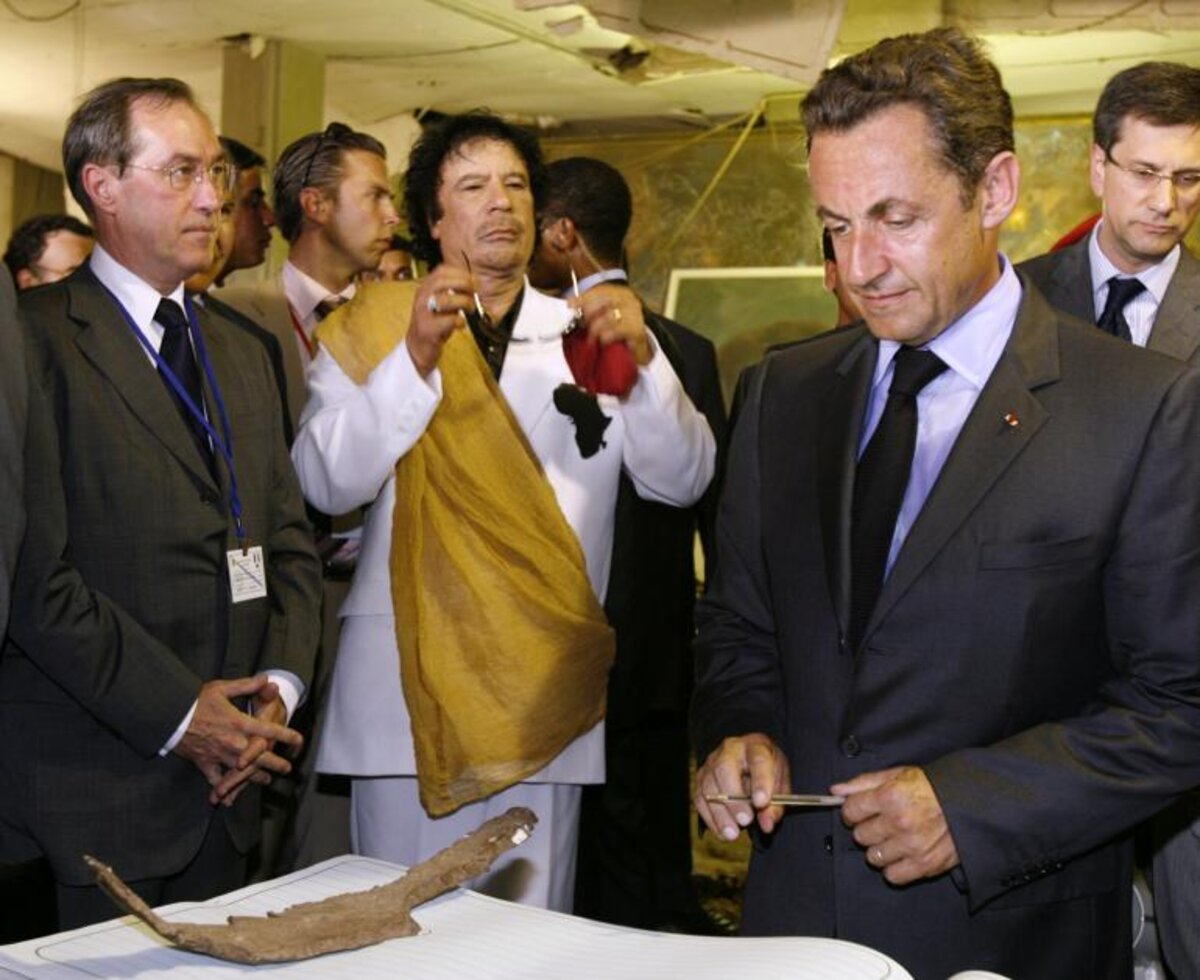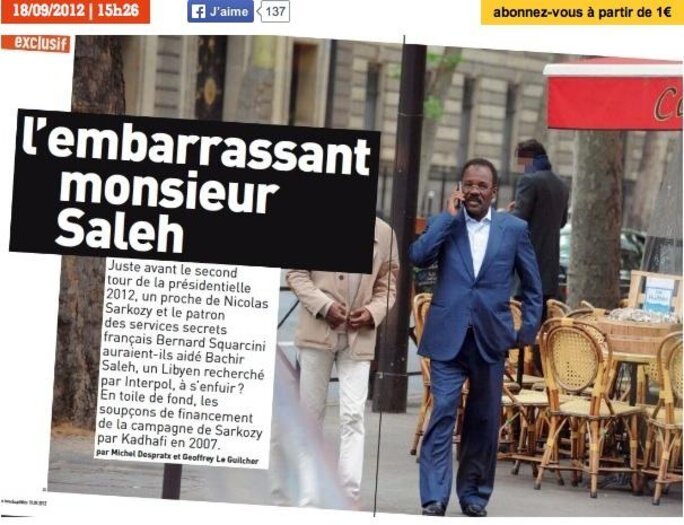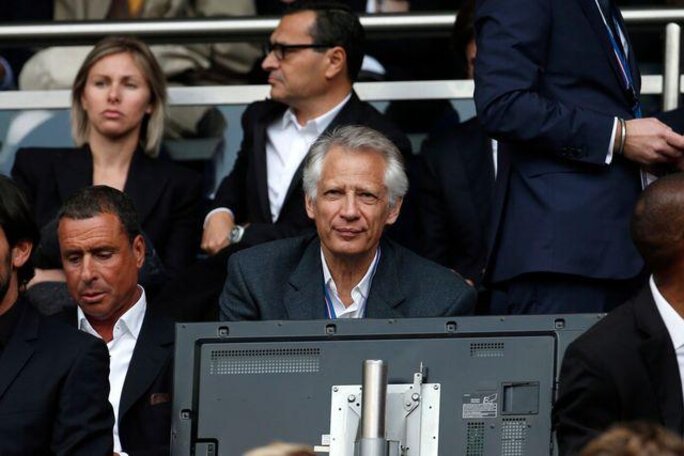A French judicial investigation has established the circumstances in which a leading official in the regime of late Libyan dictator Muammar Gaddafi, and who is regarded as a key witness in the probe into the suspected secret funding by the regime of Nicolas Sarkozy’s 2007 presidential election campaign, was smuggled out of France in May 2012 with the help of a businessman close to Sarkozy’s long-serving chief of staff, and subsequently interior minister, Claude Guéant.
Mobile phone records, and data from mobile phone transmitter masts, indicate the rapidly-organised flight of Bashir Saleh, head of Gaddafi’s 40-billion dollar Libyan African Portfolio (LAP) sovereign wealth investment fund, was settled at a meeting between him and the businessman, Alexandre Djouhri, under the Eiffel Tower on May 3rd 2012, just days before the final round of presidential elections in which Nicolas Sarkozy was defeated by his socialist opponent François Hollande.
Also present under the Paris landmark that evening was Bernard Squarcini, Sarkozy’s head of domestic intelligence, the DCRI.
The evacuation of Saleh, who faced imminent arrest after featuring on an Interpol ‘wanted’ list, is believed to have taken place that same night by private jet. After first travelling to his native Niger, in West Africa, Saleh soon after settled in South Africa, where he continues to live. The background to his hurried exit from France and the apparent connivance of the then-head of the domestic intelligence agency raises disturbing questions over the motives behind his protection.
On April 28th 2012, Mediapart revealed a letter recovered from the archives of the Gaddafi regime, dated December 2006, in which Saleh was informed of Libyan agreement to fund Nicolas Sarkozy’s 2007 presidential election campaign. The letter, signed by Gaddafi’s foreign intelligence chief, Moussa Koussa, was addressed to Saleh who, as president of the LAP, one of the main investment arms of the regime, was in charge of supervising the payments.
The document provided the most compelling evidence until then - on top of other witness testimony and documents - of the Gaddafi regime’s agreement to illegally fund Sarkozy’s 2007 election campaign. Sarkozy has vigorously denied receiving funds from the dictator.

Enlargement : Illustration 1

In 2013, a judicial investigation was opened into the allegations and is ongoing. Mediapart has gained access to a summary report by the two magistrates leading the case, in which they detail the evidence of the secret meeting under the Eiffel Tower on May 3rd 2012, and which confirms a report first published in September 2012 by French magazine Les Inrocks.
Saleh, now 68, fled to France in October 2011 after the collapse of the Gaddafi regime that summer. In April 2012, French investigative weekly Le Canard enchaîné reported that Saleh enjoyed official French protection and that it was France’s ambassador to Tunisia, Boris Boillon, who oversaw Saleh’s escape from Libya, where he had been placed under house arrest by a rebel militia. The weekly reported that Saleh was flown to France via Tunisia in a private jet organised by Alexandre Djouhri.
Then-interior minister Claude Guéant confirmed that a residency permit had been delivered to Saleh and his family. Guéant told the Canard enchaîné that Saleh had been granted “a provisional three-month authorization to stay [in France] because his family resides in France”.
When, on April 28th 2012, Mediapart published the letter addressed to Saleh from Moussa Koussa authorising the funding of Sarkozy’s campaign, Saleh had since March that year been the subject of a ‘red notice’ issued by Interpol for his arrest pending an eventual extradition back to Libya where he was wanted by the country’s new authorities on charges of fraud, misappropriation of public funds and abuse of power. However, he appeared to be free in his movements in France, as demonstrated by a photo of him wandering a street in the capital in May 2012 published by weekly magazine Paris Match.
Immediately after Mediapart’s report, through the intermediary of his lawyers, Saleh denied being the addressee of the Moussa Koussa letter (later denouncing it as a fraud), before he then fled, on May 3rd 2012, from France to his native Niger.

Enlargement : Illustration 2

The day before Saleh’s flight, then-French president Nicolas Sarkozy, in an interview with RMC radio and BFM TV news channel, said that if Saleh was sought by Interpol, “he will be handed over to Interpol”, and suggested that Saleh had not been arrested because of confusion over his name.
“On the Interpol arrest warrant, there is another [different] identity,” he continued. “The services of the foreign affairs ministry and the interior ministry are in the process of looking at the issue.” Sarkozy was referring to the name that appeared on the Interpol ‘red notice’ which was that of Bashir Al Shrkawi, the name in which a passport was issued to Saleh in Niger.
The ongoing French judicial investigation into the suspected funding of Sarkozy’s campaign by Gaddafi unearthed evidence of a mysterious bank transfer via an account in Malaysia in March 2008, of 500,000 euros in favour of Claude Guéant, Sarkozy’s long-serving chief of staff who was appointed as his interior minister in 2011. The money transfer is believed to have been initiated in Saudi Arabia.
The investigation also discovered from documents found in Bashir Saleh’s apartment in Paris that the banker suspected of being at the origin of the transfer to Guéant, Wahib Nacer, also managed bank accounts belonging to Saleh.
More recently, the magistrates focussed on the circumstances surrounding Saleh’s departure from France on May 3rd 2012. Mobile phone records and those of mobile phone transmitter masts revealed the presence underneath the Eiffel Tower that early evening of Saleh and Djouhri, and also of domestic intelligence chief Bernard Squarcini, a close ally of Sarkozy’s.
“The phone records and the mobile phone mast communication of the different phones used by the three protagonists demonstrate that Alexandre Djouhri was in contact that day on several occasions with Bashir Saleh as well as Bernard Squarcini,” the magistrates wrote in a summary of their investigations seen by Mediapart. “The phones used by Bashir Saleh and Alexandre Djouhri also locked onto the mobile transmitter masts of the Eiffel Tower zone between 18:00 hours and 19:00 hours that day. During the same time period, it is found that the phone used by Bernard Squarcini was switched off between 18:24 and 18:43, until Alexandre Djouhri calls him at 18:44, before Bernard Squarcini himself calls [Marcel] Ceccaldi, lawyer for Bashir Saleh, at 18:46.”
Contacted by Mediapart, Marcel Ceccaldi confirmed that he had warned his client over the imminence of his arrest in response to the Interpol ‘red notice’, and that he remembered the call he received from Squarcini. “It was very brief, said Ceccaldi. “He told me ‘things are in order, it’s done, it’s sorted out’. I knew that he [Saleh] had to leave.”
'It will be hard for you to obtain a statement from Saleh'
The investigation, as the magistrates write in their case notes, has also established that on the same day as the meeting at the Eiffel Tower, “Alexandre Djouhri contacted on three occasions, between 19:14 and 20:47, the private jet company Masterjet Aviaco Executiva at Le Bourget [airport], while Bernard Squarcini called Hugues Moutouh, then special advisor in the cabinet of Minister of the Interior Claude Guéant, and this during 48 seconds.”
Contacted by Mediapart, Moutouh said he was certain that he did not discuss the Libyan funding allegations with Squarcini. “I often had Bernard on the phone, but I did not speak about that with him, nor with the minister,” he said. “I didn’t follow that type of subject.”

Private jet hire company Masterjet Aviaco Executiva was responsible for a flight made on May 3rd 2012 out of Paris’ Le Bourget airport - following Djouhri’s phone contact with the firm - to Niger’s capital Niamey. The flight was paid for by a Djibouti-based company called Datco. The French judicial investigation has ascertained that Datco is represented by Mohammed Aref, a lawyer known to Djouhri, and who is also a brother-in-law of Wahib Nacer, Saleh’s banker.
A former official with the Gaddafi regime who was questioned by the magistrates under the status of “anonymous witness” – i.e. his identity cannot be revealed - confirmed Djouhri’s role in organising Saleh’s departure from France. “It is Alexandre Djouhri who looked after that by getting him to take a special plane to carry him from Le Bourget to Niger […] subsequently, people close to Sarkozy advised Bashir to leave Niger for South Africa, which he did,” the official said in a statement to the magistrates.
As head of of Gaddafi’s multi-billion-dollar Libyan African Portfolio (LAP) sovereign wealth investment fund, Saleh played the key role in Tripoli’s financial dealings abroad, and became the Libyan official who was the closest to Sarkozy and his government.
In May 2012, Mediapart published the transcript of the first phone conversation between Sarkozy and Gaddafi after Sarkozy’s election as French president in May 2007, during which Gaddafi was offered French cooperation to develop a nuclear power programme, along with sales of weapons and security systems. The transcript, authenticated by French diplomatic sources, is a word-for-word account written in Arabic of the conversation held on on May 28th 2007, less than two weeks after Sarkozy came to office.
Towards the end of the conversation, Sarkozy returns to earlier suggestions of the necessity for a direct contact with Bashir Saleh. “Who is the person who I could meet to discuss with them delicate questions?” Sarkozy asked Gaddafi. “Is it Mr Bashir or the minister who comes on your behalf?” The Libyan dictator replied: “It could be Bashir because he speaks French and you can talk together directly.”
Sarkozy then said: “Understood Mr. Leader, so I will meet with Mr Bashir and work things out with him and perhaps at that moment a visit that you will make to France or that I will make to Libya.”
In July 2008, Saleh’s wife, née Kafa Kachour, who owned a luxurious holiday villa in eastern France, close to the Swiss border at Prévessin-Moëns, obtained French nationality after direct intervention in her favour of the French presidential office. A Lebanese national, she obtained her naturalization in less than three months, after then-president Sarkozy’s advisor for African and Middle East affairs, Boris Boillon, directly intervened on her behalf. On July 4th 2008, Boillon wrote to the sub-prefect of the region in which Kachour’s house was situated, and where her demand for French nationality was processed. “Madame Bashir [sic] is the wife of the chief of staff of Colonel Gaddafi with whom we have solid working relations,” wrote Boillon. “For reasons of the importance of the strategic partnership between France and Libya, I would be grateful to you for agreeing to study with benevolence Madame Bashir’s case, and to keep me personally informed.”
Several witnesses have given statements to the ongoing judicial investigation about Bashir Saleh’s eventual role in the alleged Libyan funding of Sarkozy’s 2007 election campaign. One of them is Paris-based Franco-Lebanese businessman and arms broker Ziad Takieddine, a key intermediary for Sarkozy and his staff’s dealings with Arab states and who is implicated in a separate investigation into suspected illegal political funding via commissions paid in French weapons sales abroad. In 2005, Takieddine introduced the then-interior minister Sarkozy and Claude Guéant, then Sarkozy’s his chief of staff to insiders in the Libyan regime. Takieddine has told magistrates that Guéant provided Saleh with “banking details” for payments by the regime.
Another witness is Zahra Mansour, a former leading official in the Libyan foreign ministry, who has testified that he learnt from Gaddafi of the existence of “financial support” for Sarkozy’s campaign. “I know that Bashir Saleh was very, very close to Colonel Gaddafi and that he was in charge of all Libyan investment in Africa, representing a portfolio of 25 billion dollars,” she said in a statement given in January 2014. “It will be hard for you to obtain a statement from Bashir Saleh, because Nicolas Sarkozy helped him to get out of prison to come to France, and from France to South Africa,” she added. “I suppose that the intervention of Nicolas Sarkozy must have followed an agreement made with Bashir Saleh on condition that he guaranteed never to say anything.”
Following the overturning of the Gaddafi regime in 2011, the funds under Saleh’s control were among the Libyan assets frozen by the international community. Unconfirmed reports suggest Alexandre Djouhri had offered to help in releasing some of Saleh’s blocked personal accounts, and that a meeting to that effect was held in May 2012, shortly before Saleh fled France, between Saleh, Djouhri and former French prime minister Dominique de Villepin, who set up business as an international lawyer after leaving office in 2007.

Enlargement : Illustration 4

Transcripts of police phone taps targeting Claude Guéant revealed how Djouhri, who remained close to the former interior minister after the socialist victory in presidential and parliamentary elections in 2012, travelled to South Africa in September 2013 to meet with Saleh. Extracts from the transcripts, obtained and published by French daily Le Monde, include a phone call to Guéant from Djouhri while he was in South Africa, in which the latter claimed Saleh had been made an offer by the French socialist government. “To say, there you are, yes, indeed, I would have financed…some…but muck, and then, they [will] give him schooling for the children, they ask Libya to lift the Interpol [arrest] request,” Djouhri told Guéant. “Frankly, eh? What politics…what politics!”
“It’s skullduggery,” replied Guéant. “It’s incredible. It’s so low.”
“They minimised the guy,” said Djouhri. “It proves to you that they don’t know the guy’s career.” Djouhri then explained that Saleh was “not happy” with the events. “He told me ‘I was always pro-French, and there’s how France thanks me’.”
“Yes, it’s true that he was very Francophile, the boy,” answered Guéant. “He was a proper pathway between France and Libya at the time…”
“Ah, well, he’s truly disappointed,” added Djouhri.
The subject of the conversation later changed to what appears to be a business opportunity.
“We’ll go and see the Popovs together, eh? The Russians,” suggests Djouhri.
Guéant: “Ah, with pleasure, yes with pleasure.”
Djouhri: “As soon as they arrive they’re going to keep me informed, and I’ll keep you informed at the beginning of the week.
Guéant: “O.K.”
Djouhri: “Come on, let’s get at it.”
Guéant: “Thank you. Right then, have a good stay, goodbye.”
-------------------------
- The French version of this article can be found here.


